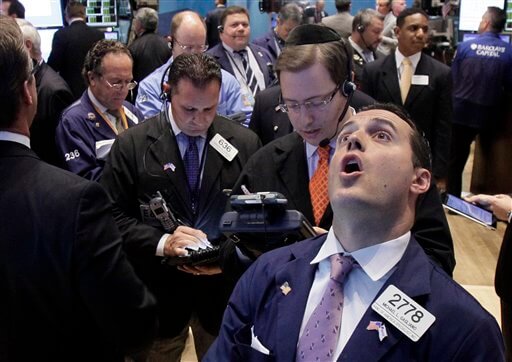
The European debt crisis continued to weigh on financial markets Tuesday, sending the Standard and Poor’s 500 stock index near what many consider to be a bear market. The yield on the 10-year Treasury note fell near a record low as investors piled into lower-risk assets.
Stocks fell broadly as investors worried that Greece might be edging closer to default. European finance ministers suggested at a meeting Tuesday that holders of Greek debt may be required to take larger losses than originally thought, which could hamper banks that hold Greek debt and rattle global financial markets. Greece has said it wouldn’t be able to make budget cuts it had agreed to as part of a deal to receive emergency loans.
The S&P 500 fell 10 points, or 0.9 percent, to 1,089 as of 11:15 a.m. It had been down as many as 24 points in the first half-hour of trading. The index is now 20 percent below its April 29 high of 1,363, meeting the criteria of a bear market.
The Dow Jones industrial average lost 147, or 1.4 percent, to 10,510.The Dow is 18 percent below its recent peak.
Smaller companies bucked the downward trend. The Nasdaq composite rose 9, or 0.4 percent, to 2,344. The Russell 2000 index of small companies gained 9, or 1.4 percent, to 618.
“Europe is the center point of all of this,” said Paul Zemsky, head of asset allocation at ING Investment Management. “The big fear in the market is that company earnings are not sustainable and that Europe’s problems are going to spread into the U.S. banking system.”
In testimony before Congress, Federal Reserve Chairman Ben Bernanke said the economy is weaker than the central bank expected and that poor job growth continues to undercut consumer confidence. He warned Congress that deep spending cuts may impede a recovery.
Bernanke also said the central bank is prepared to take further action to stimulate the economy. That could mean another round of asset purchases, a tactic known as quantitative easing, noted David Ader, chief government bond strategist at CRT Capital Group.
The yield on the 10-year Treasury fell to 1.72 percent, just above its record low of 1.71 percent reached on Sept. 22. Bond yields fall as prices rise.
In corporate news, Bank of America Corp. lost 2.5 percent to $5.40 as investors continued to be troubled by its exposure to soured mortgages securities and a several-day outage of its website. The company’s stock lost 9 percent Monday to $5.53, a level not seen since 2009.
Apple Inc. is widely expected to announce the newest version of its iPhone Tuesday. Tim Cook, who took over the company’s CEO role from co-founder Steve Jobs in August, is expected to unveil the new smartphone at Apple’s Cupertino headquarters. The company gained 1.2 percent in early trading.
European indexes also declined sharply. Benchmark indexes in Germany, France, and Spain each lost more than 2 percent.
Copyright 2011 The Associated Press.






























